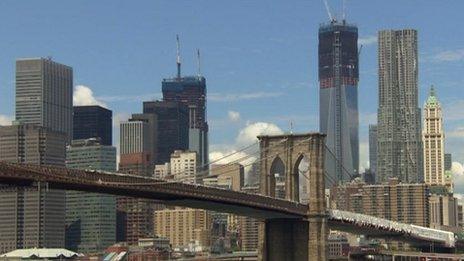Europe: The monster under the bed?
- Published
- comments

President Barack Obama has gone out of his way to highlight the importance of Europe to the US economy. He called an unscheduled news conference at the White House, and began by talking not about America, but Europe.
Indeed, not for the first time, he stuck his oar right into the middle of sensitive European policy-making, saying that Greece should remain in the euro, and exit would make the lives of Greeks harder.
I have just come back from New York, where I've been looking at why the US president is so concerned by what is happening across the water.
I'll start in New York's Astoria area, which became "Greek Town" in the 1960s when economic migrants came to Queens.
It is a cosmopolitan area, and on the news-stands there are Serbian and Romanian papers as well as Greek. Just off the high street there's a Czech restaurant and an Irish pub next to a Greek bakery and an outlet offering grilled lamb chops.
Most Europeans who have chosen to become Americans did so because they thought they would make more money, and would have a better chance of getting on in the world across the Atlantic. There are sentimental ties that bind the old world and the new, but there are also economic ones.
A group of young men sitting drinking frappe in the Athens Cafe, have come from Pennsylvania for the day to see relatives.

Endless speculation over the fate of the euro is animating Greeks in New York
They are Americans, but not - as one of them puts it - "McDonald's Americans". They're proud of their heritage and the achievements of their parents or grandparents. One has a Greek flag case for his iPhone, and the same blue and white cross and stripes on his baseball cap. Two others play with their worry beads as they talk. But they're not so much worried as embarrassed by what's happening in the old country.
"Yeah, it pisses you off. Of course you're embarrassed."
His friend chips in: "Everybody at work tells me, 'You're making my gold go up and down, that's what they tell me at work every day. What are you gonna do?"
"The Greeks in this country are very prideful people, hardworking people, who take advantage of opportunities," another says.
"And now you get a reputation for not paying your debt and causing economic trouble. Embarrassed? Yeah of course you're embarrassed."
They don't see the crisis at home hitting the US, or their own various businesses. However, they do think it will hurt some Greek Americans, who will see investments back home take a nosedive.
Feeling the pinch
Others aren't so sanguine about the fallout from Greece and Spain. The chairman of the Federal Reserve, Ben Bernanke, has warned of a "significant risk" to the US economy from the euro crisis.
The more I look into this, the more it seems to me this is about nervousness about the future, which makes the system freeze up, rather than concrete examples of layoffs and job losses as exports drop.

The ancestral home is never forgotten
The USA does more business with China, Canada and Mexico, external than the European Union, but Europe is still an important market.
Certainly some manufacturers are feeling the pinch although they are understandably reluctant to talk about it. The companies that do the most business in Europe are the iconic big name brands, external, the Coca Colas, IBMs and McDonalds of the world, and problems in Europe must be reflected in their sales.
I meet William Lauder, the executive chairman of cosmetics giant Estee Lauder, external in an elegant and opulent reception area modelled on a room in the home of his grandmother, the company's founder. There's no sign here of a business under pressure. Indeed, Mr Lauder tells me business is good, external and expanding. But sales have fallen, external in southern Europe.
"The big engine for the economy in North America, and the big engine for the economy in Europe, is consumers and consumer confidence.
"It's quite obvious that there is a concerned consumer in all of these markets who is holding back, and therefore not spending the same way we are, so from our perspective we don't see the same robust consumer demand in those markets as we had in the past."
He is less concerned about this because of the huge opportunities offered in his biggest expanding market, China. He puts it in a very vivid way:
"We are in something like 47 cities in China. That's a drop in the bucket - maybe 250 or 300 million [people] out of a population of 1.5 billion. We're in 57 cities in the UK alone so there's still an awful lot of runway there, and an awful lot of opportunity."
But the European crisis is making him ask some serious questions.
"Should we be making capital investments in euro-denominated countries? Investments in people, investments in capital structure, in plants, or other factories? Should we be moving production that is euro-based in euro countries to non-euro countries because of some stability issues?"
Lehman on steroids?
Estee Lauder is just one company, although a huge one. On Wall Street they get an overall picture and there I detect a different mood to some of my previous visits. Then, whatever the problem, someone would tell me the crisis was an opportunity. Not this time.
Kenny Polcari: "No-one alive today has lived through an exit from the eurozone. Now we're talking about countries defaulting and exiting; and no-one knows how interconnected that all is, in the banking system and the political structure and the currencies.
"As much as professionals try to tell us what it's like, the fact is we won't know what it's like until it happens, and that's where the real nervousness comes in."
This nervousness is having an impact right now, Art Cashin says.
"Over the last week we've had 23 pieces of economic data; 21 of them have been below expectations, and that is because of hesitation over the negative possibilities that may come out of Europe and the euro."
He adds that the nerves are having a real effect on people on Wall Street.
"They're afraid it could turn into something like Lehman on steroids.... you could have a drop in the Dow of 500 or even 1,000 points in a day. That's not beyond belief. As people get hesitant, and think there might be a monster under the bed, they get very cautious."